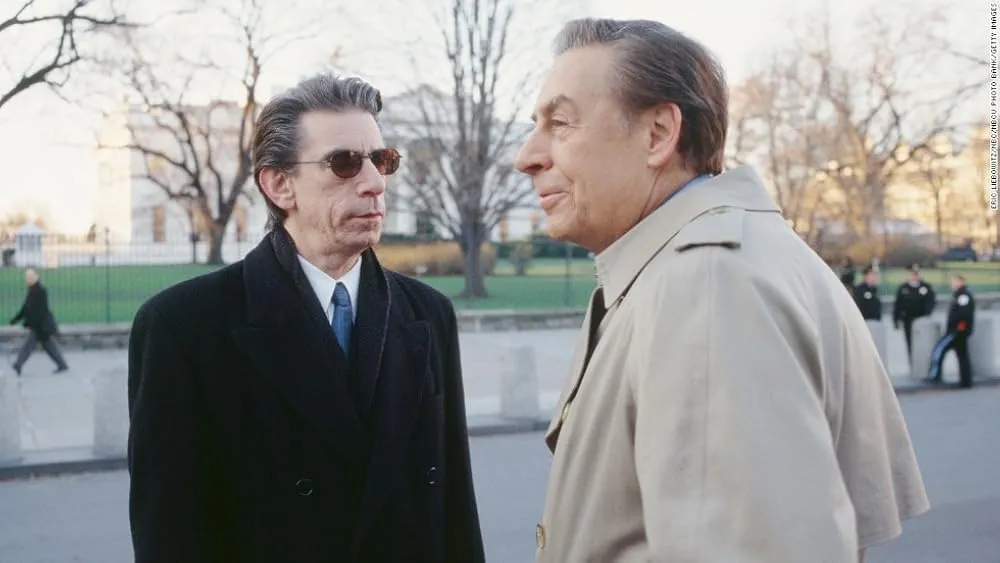
Sideshow (S09E14)
Airdate: 17 February 1999
Written by: Rene Balcer
Directed by: Edwin Sherin
Running Time: 45 minutes
In an era where the #MeToo movement has recalibrated societal norms around sexual misconduct and accountability, it is difficult to recall a time when prominent progressive figures would champion a high-ranking public official accused of sexual impropriety with such fervour. Yet, during the late 1990s Monica Lewinsky scandal, the cultural and political landscape was so polarised that Bill Clinton’s transgressions were treated not as a moral failing but as a partisan battleground. For many on the American left, Clinton—a figure idolised by Hollywood and the intelligentsia—was beyond reproach, while his accusers and pursuers, particularly Independent Counsel Kenneth Starr, became the true villains. This ideological divide permeates Law & Order’s Sideshow, an episode airing just five days after Clinton’s Senate acquittal in 1999. By casting Starr as a tyrannical prosecutor and framing the scandal through a lens of partisan warfare, the episode mirrors the era’s hyperpartisanship. Compounding its historical significance, Sideshow is the first part of a two-part crossover with Homicide: Life on the Street, further underscoring its ambition to transcend the procedural’s usual standalone format.
The plot, as with previous Law & Order–Homicide collaborations, prioritises contrivance over coherence to justify collaboration between New York and Baltimore law enforcement. The episode opens in New York, where a vacationing family discovers the body of Janine McBride, a federal official previously stationed at the White House and later transferred to Baltimore’s Social Security Administration. Detectives Lennie Briscoe (Jerry Orbach) and John Munch (Richard Belzer) uncover that Janine was suffocated before being shot and transported from Baltimore to New York. Interviews with her associates reveal she was a lesbian, and her lover, Faye Wellington (Meg Gibson), identifies Chesley Purcell (Delissa Reynolds), a Black prostitute, as the last person seen with Janine. However, the investigation is derailed by the relentless William Dell (George Hearn), a Starr-like prosecutor intent on exposing federal corruption. Dell pressures Assistant District Attorney Jack McCoy (Sam Waterston) to disclose Wellington’s identity, breaching confidentiality. Purcell is arrested but summoned by Dell to a federal grand jury; en route, she is killed by Ned Burks (Adam Grupper), Janine’s vengeful ex-boyfriend.
While Sideshow adheres to the Law & Order formula—combining legal procedural tropes with social commentary—it struggles to offer anything genuinely novel. The episode’s primary narrative engine is its allegorical critique of Starr, embodied by Dell, whose authoritarianism is telegraphed through Hearn’s performance. Dell’s relentless pursuit of political dirt over justice mirrors the era’s perception of Starr as a partisan zealot, though the portrayal lacks nuance. The social agenda is equally unambiguous: Janine’s sexuality is framed as a secret to be protected, reflecting 1990s liberalism’s limited understanding of homosexual representation. Meanwhile, the procedural elements—such as the jurisdictional overlap and the rushed resolution of Purcell’s death—feel derivative, relying on the show’s well-worn structure rather than inventive storytelling. A rare nod to continuity occurs when Dell’s clashes with McCoy echo prior episodes, a rare concession to narrative cohesion in a series built on standalone episodes.
Writer René Balcer’s script occasionally falters under the weight of its historical allegories. His reliance on 1950s and ’60s Cold War-era parallels feels forced. McCoy’s retort to Dell—“Have you no shame?”—a direct reference to Joseph Welch’s rebuke of Senator Joseph McCarthy during the Army-McCarthy hearings—feels overly didactic, shoehorning historical context into a dialogue that could have stood on its own. Similarly, the finale, in which Purcell is killed before testifying, evokes the Jack Ruby–Lee Harvey Oswald dynamic, suggesting a conspiracy theory undertone that clashes with the episode’s otherwise straightforward narrative. These moments, while thematically rich, strain credibility, prioritising political messaging over organic storytelling.
A lighter interlude involves Munch’s comedic subplot. Visiting Washington, he files a Freedom of Information Act request to review his FBI file, expecting documentation of his 1960s radicalism. Instead, he finds himself labeled a “harmless eccentric,” a joke underscoring the absurdity of bureaucratic overreach. Though brief, this sequence humanises Munch and injects levity into the otherwise grim proceedings, though its relevance to the main plot is negligible.
The episode’s conclusion leaves the central mystery unresolved, as the primary suspect (Purcell) is killed, forcing the sequel to contrive a new angle. This anti-climax undermines the tension built around Dell’s manipulations and McCoy’s resistance. The writers’ decision to eliminate the main suspect early raises questions about the second part’s ability to sustain interest without resorting to contrivance.
In sum, Sideshow is a product of its time—a procedural drama wrestling with the Clinton era’s moral and political ambiguities while clinging to its formula. Its strengths lie in its historical context and George Hearn’s formidable portrayal of Dell/Starr, but its reliance on tired tropes and heavy-handed allegory prevents it from transcending mediocrity.
RATING: 5/10 (++)
Blog in Croatian https://draxblog.com
Blog in English https://draxreview.wordpress.com/
InLeo blog @drax.leo
Hiveonboard: https://hiveonboard.com?ref=drax
Rising Star game: https://www.risingstargame.com?referrer=drax
1Inch: https://1inch.exchange/#/r/0x83823d8CCB74F828148258BB4457642124b1328e
BTC donations: 1EWxiMiP6iiG9rger3NuUSd6HByaxQWafG
ETH donations: 0xB305F144323b99e6f8b1d66f5D7DE78B498C32A7
BCH donations: qpvxw0jax79lhmvlgcldkzpqanf03r9cjv8y6gtmk9